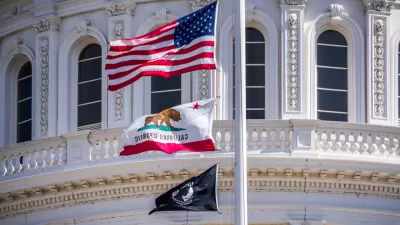The battle over the efficiencies and infrastructure required in building codes continues.

In March 2021, the International Code Council (ICC), a private consortium that controls building code regulations for most of the United States and Latin America, voted to "reduce the power of cities and local jurisdictions over building efficiency requirements," according to March 2021 Planetizen coverage of the news.
The ICC's vote came as a final, sweeping blow in a long battle by industry powers to push back against local control over local building and energy laws. With its March 2021 vote, the ICC decided to remove code making powers from local governments, placing those responsibilities instead in the hands of a "technocratic committee that gives companies equal say to public servants," according to Alexander C. Kaufman, writing for the Huffington Post (Kaufman also provided breaking new coverage of the ICC vote in March 2021).
Kaufman is still tracking the ongoing battle over carbon emissions from the nation's building stock. In March 2022, Kaufman reports that "new drama is afoot" at the ICC, after "a single email secretly sent by a gas utility nearly gutted a proposal widely seen as vital to increasing the adoption of electric vehicles."
Here are the salient details of the drama:
After weeks of discussion over a proposal to require developers to include the circuitry to charge electric vehicles in more new buildings ― which can cost more than six times more to retrofit into a structure after it’s built ― the chairman of the committee, Duane Jonlin, abruptly announced in an email that he had decided to strike the proposal from the code. Instead, he said it belonged in the “appendix” that serves as a bonus menu that some more ambitious cities and towns may choose to adopt, according to copies of the exchange HuffPost obtained from a source who requested anonymity because the internal emails were private.
Kaufman and the HuffPost team dig deeper via public records request, reporting that Spire Energy, the $3.5 billion St. Louis-based gas company, "privately reached out to challenge the electric vehicle provisions."
According to Kaufman, environmentalists and code reform advocates fear the incident reveals broader leverage for polluters in building codes than before last year's vote.
FULL STORY: A Battle Over Building Codes May Be The Most Important Climate Fight You’ve Never Heard Of

Alabama: Trump Terminates Settlements for Black Communities Harmed By Raw Sewage
Trump deemed the landmark civil rights agreement “illegal DEI and environmental justice policy.”

Study: Maui’s Plan to Convert Vacation Rentals to Long-Term Housing Could Cause Nearly $1 Billion Economic Loss
The plan would reduce visitor accommodation by 25% resulting in 1,900 jobs lost.

Planetizen Federal Action Tracker
A weekly monitor of how Trump’s orders and actions are impacting planners and planning in America.

Wind Energy on the Rise Despite Federal Policy Reversal
The Trump administration is revoking federal support for renewable energy, but demand for new projects continues unabated.

Passengers Flock to Caltrain After Electrification
The new electric trains are running faster and more reliably, leading to strong ridership growth on the Bay Area rail system.

Texas Churches Rally Behind ‘Yes in God’s Back Yard’ Legislation
Religious leaders want the state to reduce zoning regulations to streamline leasing church-owned land to housing developers.
Urban Design for Planners 1: Software Tools
This six-course series explores essential urban design concepts using open source software and equips planners with the tools they need to participate fully in the urban design process.
Planning for Universal Design
Learn the tools for implementing Universal Design in planning regulations.
Caltrans
Smith Gee Studio
Institute for Housing and Urban Development Studies (IHS)
City of Grandview
Harvard GSD Executive Education
Toledo-Lucas County Plan Commissions
Salt Lake City
NYU Wagner Graduate School of Public Service





























